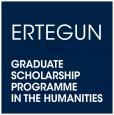Ertegun Conversations in the Humanities
It’s easy to lose oneself in one’s own field. At the Ertegun House, we draw on and represent all the Humanities faculties inside Oxford, but we don’t specifically work together on research projects. The wider framework of the Humanities is always there, like an aura enveloping the House: from time to time a few scholars might discuss their career prospects in the kitchen, react to new policy, or reach outside their discipline during another scholar’s seminar or a cultural trip. This term though, the Humanities were given their own series of events, where we came together to talk about overarching issues and themes that invariably affect us all. The series was inspired by the European Humanities Conference, held by UNESCO in May. This was a conference designed to influence policymaking on the Humanities across Europe’s governmental and non-governmental bodies, and its sessions were mirrored by a Youth Forum comprised of DPhil students and early career researchers. There, we discussed what the most pressing issues will be in the Humanities over the next 20 years: from funding and job prospects, to interdisciplinarity, open-access policies, or non-academic pathways. I thought that the Ertegun House would be a perfect venue for a similar conversation, and so it proved.
The sessions were loosely arranged under themes with wide-ranging meanings and implications for the Humanities: interdisciplinarity, the relationship with cognitive sciences, visual culture in the 21st century, and our own future as Humanities researchers. The first session then dealt with the possibilities and challenges of communication between disciplines. My own DPhil work deals with quantification and other methodologies borrowed from hard sciences, such as meta-analyses, and it is important to consider the process of borrowing a concept, so that the concept does not become distorted or outdated in its new application. In a small group, we were able to touch on the finer distinctions between true interdisciplinary work (perhaps involving multiple authors, each firmly remaining within their own field) and transdisciplinary work, which all too often passes for interdisciplinarity. In the second session, Gervase introduced some of us to Ai, a robot with a woman’s face that has its own art gallery. We talked about how the Humanities should interact with the digital medium, and what intrinsically remains in the Humanities in an age of AI and automation? Beyond introducing Digital Humanities in schools and universities, what does it mean when bots attempt to write Harry Potter fan fiction, Japanese men marry holograms, and futurologists claim that computing power may exceed the brain’s within our lifetime?
This led into the third session, centered on the senses and in particular vision, whose role in dominating perception has all too easily been acknowledged but not probed. How do we pay more attention to sound, smell, touch, in the Humanities? From recreations of medieval feasts in the classroom, to archiving the sounds of the Bodleian Library or using video game graphics to tour the Library of Alexandria, we can engage with our subjects in a multisensory way. Equally, the very idea of senses and their hierarchy deserved to be examined, since other cultures have their own ontologies of aesthetics and sense—an example being Rasa aesthetics, explored in an Ertegun exhibition last year.
Finally, in a small group towards the end of term, we considered our own positions and futures. There is a shift towards recognizing the importance of wellbeing in one’s life—whether professional, personal, or social. Therefore the question of happiness with our careers becomes an important one to ponder: can we have the freedom of research to be happy with our field? What about work-life balance, or institutional factors such as availability of jobs, and research funding? We considered what students are doing to feel happy (through initiatives such as The Wellbeing Thesis) and our own university’s Equality and Diversity unit.
It was refreshing and eye-opening to get together on these topics, which are relevant to whatever each of us may happen to be working on. The only thing that would have made them better was in-person discussions, but that’s the environment we are now in, which makes it all the more imperative that we start to think about the big questions going forward for the Humanities.
Stephan Nitu



